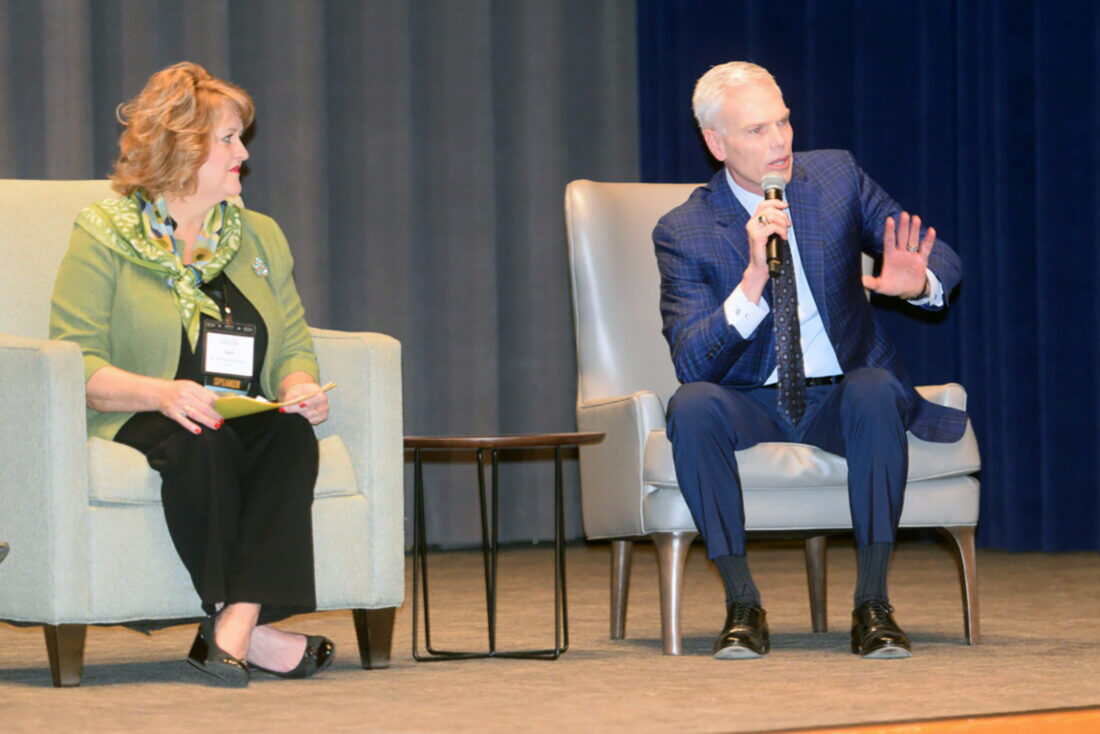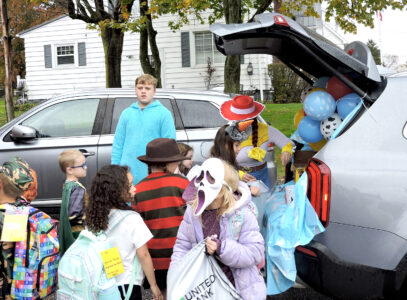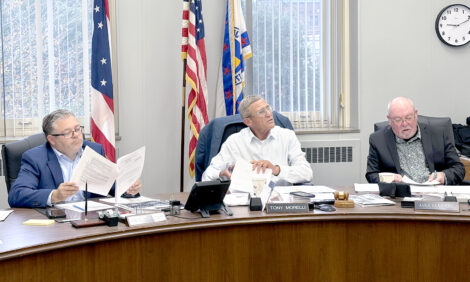Entrepreneurship for youth key to the future

BUILDING A BRIDGE — Marshall University President Brad Smith talks to the audience Tuesday during a roundtable discussion at Bridging Innovation at Oglebay’s Wilson Lodge. With him on the panel is Sara Stankus, Deputy State Superintendent of Schools in West Viriginia. - Derek Redd
WHEELING — West Virginia was built on entrepreneurship, a panel of experts said Tuesday morning. It’s the doers and the makers who are the lifeblood of the Mountain State, and that spirit needs to be cultivated and preserved in future generations.
A quartet of education officials discussed the entrepreneurial educational pipeline in West Virginia to kick off Tuesday’s roundtables at the 2023 Bridging Innovation West Virginia Entrepreneurship Ecosystem Conference, part of a week’s worth of events around Wheeling this year. Other panels looked at building entrepreneurial ecosystems, helping military veterans start and grow businesses and looking at the success stories already found in West Virginia.
The leadoff group included Marshall President Brad Smith, West Virginia State University President Ericke S. Cage, West Virginia Deputy State Superintendent Sara Stankus and Sarah Tucker, Chancellor of the West Virginia Higher Education Commission and WVCTCS.
Panel moderator Elizabeth Vitullo, Assistant Dean of Strategic Initiatives at West Virginia University’s John Chambers College of Business and Economics, started the discussion by mentioning the “historic investments” that are being made in West Virginia. Companies like Form Energy and Berkshire Hathaway Energy are moving into the state to build new facilities. Yet, she said, there are challenges keeping young people from moving away from the state.
Vitullo asked the panel in the Glessner Ballroom of Oglebay’s Wilson Lodge how people can inspire youth to think about entrepreneurship. Tucker, a Wheeling native, said the question didn’t have to be that long. A better one would be, “How do we inspire youth?”
“We know that our high school students are looking for opportunities,” she said. “We know that we have a lot of students who would stay in West Virginia if they felt that they have a place here. We know that there’s a mismatch between what our students think our state is and what our state has become in the last several years.
“And so how do we get our students to understand that?” she continued. “How do we get generations of West Virginians to understand that? How do we get into our rural areas and say to our students, look at these unbelievable opportunities that exist here? Look at the things that you can do with your life here. You don’t have to leave. You can if you want, that’s fine. But you can stay here and have an incredible future.”
Stankus said she sees that spirit in schools around the state right now. She offered the example of “The Funky Florist” at Hundred High School, a student-owned full-service flower shop run out of the school.
“There are coffee shops, there are dental programs,” she said. “There are so many things that are happening right now in the K-12 arena that are different than have ever been done before.”
Smith, a Kenova native and former CEO of software company Intuit, promoted the teaching of design thinking as a way to kindle the entrepreneurial spirit in younger generations. Design thinking is a human-centered approach to innovation. He described the steps as falling in love with a problem, coming up with at least seven different ways to solve it, then test those ways with “rapid, scrappy” experiments until you find which way will work and double down.
“If you actually look at some of the greatest innovations like Google Glass and Oculus, this virtual reality, they were invented in 45 minutes with a coat hanger, a piece of acetate and a flashlight,” Smith said. “That’s how they actually validated whether the idea was worth pursuing or not. And so we don’t need a billion dollars in investment to figure out if an idea is worth going after.”
That thought process “de-risks” some of the decisions that come with entrepreneurial thinking, Smith said. And that might be the difference-maker in whether a young person takes the leap with an idea. But Cage reminded the audience that risk is inherent in entrepreneurship, that many of the innovative thinkers sitting in the Glessner Ballroom on Tuesday went down a path and failed at a point in their lives.
Growing stronger through failures, Cage said, is part of the process. What institutions can do, he added, is create some safety nets that stop one failure from ending a young entrepreneur’s path.
“So if you do fail, it’s not going to be a cataclysmic disaster for you financially or politically or your reputation from a reputational risk standpoint,” he said. “I think all of our institutions are in a position to support this different innovative programing that we’re doing.”
In the end, Smith said, promoting an entrepreneurial spirit in West Virginia’s youth will put them on a path tread by so many West Virginians in the past and present. Their contributions to society should show young people that great things are possible in the state.
“We’ve done amazing things,” he said. “We’ve mined coal, forged steel, built roads, fought wars. We put astronauts on the moon with Homer Hickam and the Rocket Boys and we brought them safely back to earth with Katherine Johnson and Hidden Figures. There hasn’t been anything that the world has needed that we have not stepped up.”



